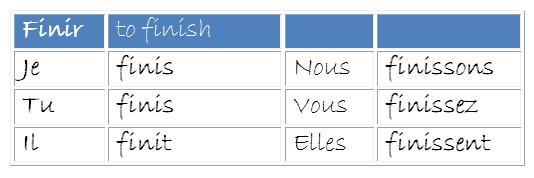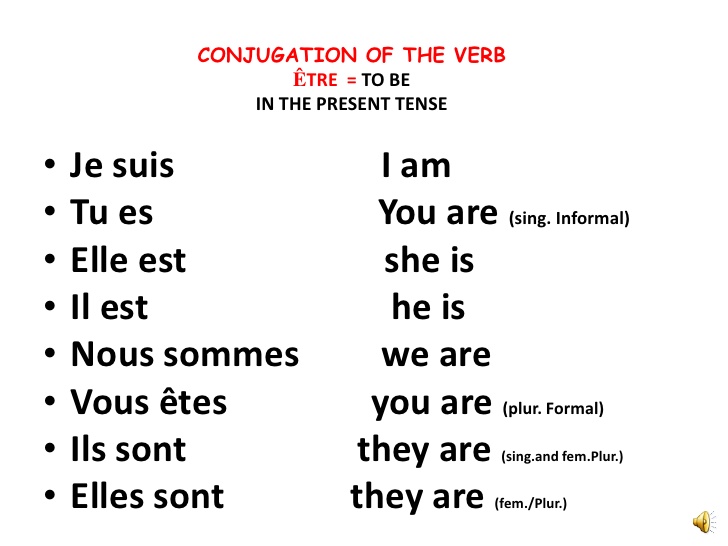How to Conjugate Regular French Verbs
To simplify things, French has classified regular verbs into three types, based on the ending of their infinitives. Think of all the things you can possibly do in one day. That’s also a lot of verbs to conjugate.
- The largest group is the verbs whose infinitive ends in -er (the -erverbs), like parler (to speak).
- The second largest group is made up of the verbs whose infinitive ends in-ir(the -ir verbs), like finir (to finish).
- The third group consists of the -reending verbs (the -re verbs), likevendre (to sell).
Each type follows a pattern of conjugation for every tense.
Think of the infinitive as the family name of a verb: A family shares a common last name, but each individual has his or her own characteristics, right. Use the infinitive to recognize the verb type (
-er, -ir, or -re) that allows you to find its conjugation pattern and also look up the verb in the dictionary.
 How to conjugate a regular -er verb
How to conjugate a regular -er verb
More than 80 percent of French verbs are
-er verbs. It’s great for you, because after you know their pattern of conjugation in the present tense, you can pretty much conjugate 80 percent of French verbs. Doesn’t that sound great?
To conjugate a regular
-er verb, drop the
-er of the infinitive to get the stem. Then add the six present tense endings specific to
-erverbs:
-e, -es, -e, -ons, -ez, -ent, and you’re done. Easy! The following table conjugates a regular
-er verb:
aimer (
to like).
| j’aime |
nous aimons |
| tu aimes |
vous aimez |
| il/elle/on aime |
ils/elles aiment |
 Aller
Aller (
to go)
is a very common verb, and it looks like a regular
-er verb. However, it is not.
Aller is a very irregular verb.
How to conjugate a regular -ir verb
The
-ir verb group is the second most common verb type. To form the present tense of a regular
-ir verb, drop the
-ir of the infinitive to get the stem for the present tense conjugation. Then add the present tense endings specific to
-ir verbs:
-is, -is, -it, -issons, -issez, -issent. The following table conjugates a regular
-ir verb:
finir (
to finish).
| je finis |
nous finissons |
| tu finis |
vous finissez |
| il/elle/on finit |
ils/elles finissent |
Not all
-ir verbs follow this pattern. So just use a little more caution when dealing with
-ir ending verbs.

 How to conjugate a regular -re verb
How to conjugate a regular -re verb
Verbs that end in
-re are the third conjugation type. To form the present tense of an
-re verb, drop the
-re of the infinitive, like you do for
-er and
-ir verbs. When you do that, you’re left with the stem for the conjugation of the present tense, and you can add the present tense endings specific to
-re verbs:
-s, -s,nothing, -ons, -ez, -ent.The following table conjugates a regular
-re verb:
vendre (
to sell).
| je vends |
nous vendons |
| tu vends |
vous vendez |
| il/elle/on vend |
ils/elles vendent |

Conjugation of Être, Avoir, Aller, and Faire verbs:
How to Conjugate the Irregular French Verbs Être, Avoir, Aller, and Faire ?
In French and in English, the verbs
être (
to be),
avoir (
to have),
aller (
to go), and
faire (
to do) are probably the most used verbs of our repertoire, which is also why they have become so twisted.
The four tables that follow give you the present tense conjugations of these verbs.
Être Verb:
 Avoir Verb:
Avoir Verb:

For pronounciation, be very careful with
ils sont (
they are)
and
ils ont (
they have),
because they have pretty similar sounds. The difference is between the soft sound of
ils sont and the
z sound created by the
liaison (the verbal link between the final
-s and the following vowel) in
ils ont.
Aller Verb:
 Faire Verb:
Faire Verb:

]]>
 Customized French Language Courses The customized intensive French courses have all the features of the professional language courses.These courses are specifically designed for people:
Customized French Language Courses The customized intensive French courses have all the features of the professional language courses.These courses are specifically designed for people:

 Il and elle
Il (he) and elle (she) may refer to a person or to a thing (it):
Il and elle
Il (he) and elle (she) may refer to a person or to a thing (it):
 How to conjugate a regular -er verb
More than 80 percent of French verbs are -er verbs. It’s great for you, because after you know their pattern of conjugation in the present tense, you can pretty much conjugate 80 percent of French verbs. Doesn’t that sound great?
To conjugate a regular -er verb, drop the -er of the infinitive to get the stem. Then add the six present tense endings specific to -erverbs:
How to conjugate a regular -er verb
More than 80 percent of French verbs are -er verbs. It’s great for you, because after you know their pattern of conjugation in the present tense, you can pretty much conjugate 80 percent of French verbs. Doesn’t that sound great?
To conjugate a regular -er verb, drop the -er of the infinitive to get the stem. Then add the six present tense endings specific to -erverbs:

 How to conjugate a regular -re verb
Verbs that end in -re are the third conjugation type. To form the present tense of an -re verb, drop the -re of the infinitive, like you do for -er and -ir verbs. When you do that, you’re left with the stem for the conjugation of the present tense, and you can add the present tense endings specific to -re verbs:
How to conjugate a regular -re verb
Verbs that end in -re are the third conjugation type. To form the present tense of an -re verb, drop the -re of the infinitive, like you do for -er and -ir verbs. When you do that, you’re left with the stem for the conjugation of the present tense, and you can add the present tense endings specific to -re verbs: 

 For pronounciation, be very careful with ils sont (they are) and ils ont (they have), because they have pretty similar sounds. The difference is between the soft sound of ils sont and the z sound created by the liaison (the verbal link between the final -s and the following vowel) in ils ont.
For pronounciation, be very careful with ils sont (they are) and ils ont (they have), because they have pretty similar sounds. The difference is between the soft sound of ils sont and the z sound created by the liaison (the verbal link between the final -s and the following vowel) in ils ont.

 ]]>
]]>
 The expression il y a is reduced to y a in everyday speech. When il y a is followed by a number, it means ago. Il y a cinq minutes means five minutes ago. Some common slang words for money include: le fric, le pèze, le pognon, des sous and for job/work: le boulot.
To express in a certain month, such as in May, use en before the month as in “en mai.” With dates, the ordinal numbers are not used, except for the first of the month: le premier mai but le deux juin. Also note that months are all masculine and not capitalized in French (same as days of the week).]]>
The expression il y a is reduced to y a in everyday speech. When il y a is followed by a number, it means ago. Il y a cinq minutes means five minutes ago. Some common slang words for money include: le fric, le pèze, le pognon, des sous and for job/work: le boulot.
To express in a certain month, such as in May, use en before the month as in “en mai.” With dates, the ordinal numbers are not used, except for the first of the month: le premier mai but le deux juin. Also note that months are all masculine and not capitalized in French (same as days of the week).]]>
 Il and elle can also mean it when they replace a noun (il replaces masculine nouns, and elle replaces feminine nouns) instead of a person’s name. Ils and elles can replace plural nouns as well in the same way. Notice there are two ways to say you. Tu is used when speaking to children, animals, or close friends and relatives. Vous is used when speaking to more than one person, or to someone you don’t know or who is older. On can be translated into English as one, the people, they, you, in the indefinite sense, and it is often used instead of nous to mean we.
Je is reduced to j’ before a word beginning with a vowel sound in both formal and informal language. Tu is reduced to t’ before a vowel sound in informal language only.
Tutoyer and vouvoyer are two verbs that have no direct translation into English. Tutoyer means to
use tu or be informal with someone, while vouvoyer means to use vous or be formal with someone.
Il and elle can also mean it when they replace a noun (il replaces masculine nouns, and elle replaces feminine nouns) instead of a person’s name. Ils and elles can replace plural nouns as well in the same way. Notice there are two ways to say you. Tu is used when speaking to children, animals, or close friends and relatives. Vous is used when speaking to more than one person, or to someone you don’t know or who is older. On can be translated into English as one, the people, they, you, in the indefinite sense, and it is often used instead of nous to mean we.
Je is reduced to j’ before a word beginning with a vowel sound in both formal and informal language. Tu is reduced to t’ before a vowel sound in informal language only.
Tutoyer and vouvoyer are two verbs that have no direct translation into English. Tutoyer means to
use tu or be informal with someone, while vouvoyer means to use vous or be formal with someone.


